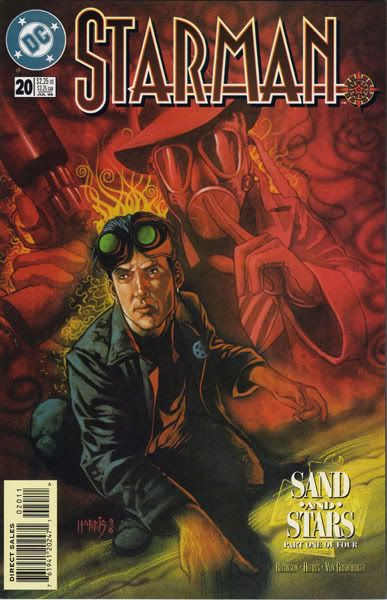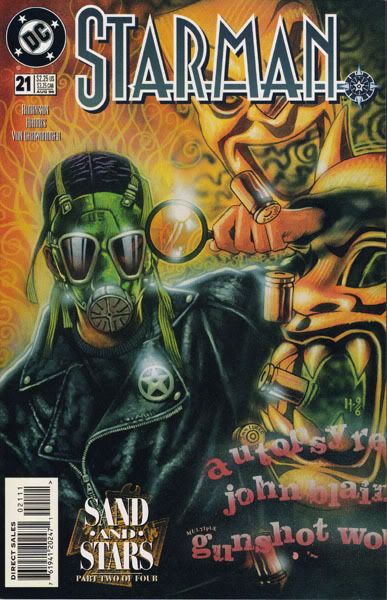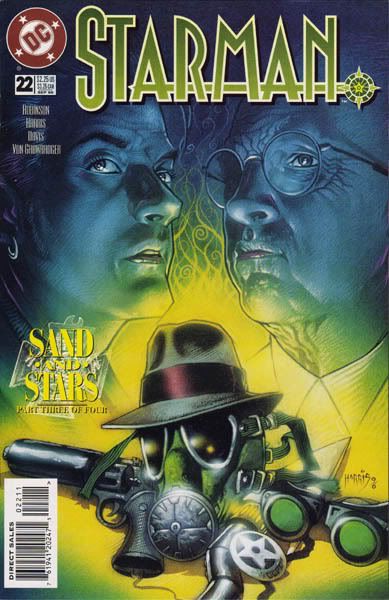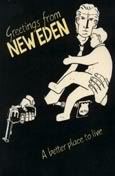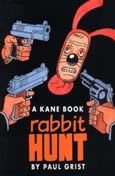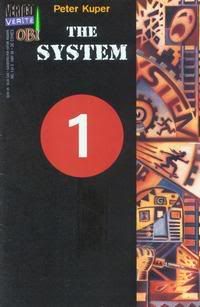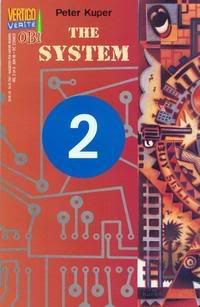Eisner: Looking back 10 years ago
During my research into the origin of the Eisner and Harvey Awards last month, I paid close attention to what was nominated 10 years ago (1997) and asked myself what is still talked about from this nomination period, and why were some things even nominated? Looking back at the 1997 list I noticed some classics, some swan songs and one time darlings of the independent circuit. The question remains though, how much do the Eisner’s (and other awards) matter a ten, five or even a year down the line. There is little doubt about how much I love my comics, but for the life of me I can’t tell you won last year. In the same line of thought, I can tell you who won the Oscar for best picture last year with out any problems— and I hardly watch movies.
So what purpose do these comic awards serve? Are these awards simply a pat on the back, or a true marker of excellence that causes us to look back and say “Check this out, it was best short story in 97”. Pardon the pun, but I think the shelf life of the importance of nomination and winning is relatively small. I admit there has been some great strides made in trying to make the awards mean more— most notably printing a banner on winning books. Again though, this only speaks to people who know what the Eisner is and what it means. How can we make these awards mean more, or become a symbol of comic cannon?
What follows is a partial list of nominees and winners. Those who won are in bold. For a full list of nominees and winners please look at this site
The complete list of winners is at the end of this article.
Best Short Story
“Gentlemanhog,” Jim Woodring, Frank #1 (Fantagraphics)
“Heroes,” Archie Goodwin and Gary Gianni, Batman: Black & White #4 (DC Comics)
“Joy Ride,” Carol Lay, Joy Ride and Other Stories (Kitchen Sink)
“The Nearness of You,” Wizard Presents Kurt Busiek’s Astro City, vol. 2, #1/2 (Homage/Wizard Press)
“Oracle-Year One: Born of Hope,” John Ostrander, Kim Yale, Brian Stelfreeze, and Karl Story, Batman Chronicles #5 (DC)
“Perpetual Mourning,” Ted McKeever, Batman: Black & White #1 (DC)
Both Heroes and Oracle-Year One share a common thread, they are (I believe to be) last works. Archie Goodwin well loved editor and writer would die suddenly in 1998, and Kim Yale, wife of John Ostrander would lose her battle with breast cancer. If memory serves, this story was published after her death. Both Ostrander and Yale helped create and flush out Oracle in the pages of the often talked about Suicide Squad.
Best Single Issue
Giant THB Parade, Paul Pope (Horse Press)
Kane #13: “Point of View,” Paul Grist (Dancing Elephant Press)
Kurt Busiek’s Astro City, vol. 2, #1: “Welcome to Astro City,” Kurt Busiek, Brent Anderson, and Will Blyberg (Jukebox Productions/Homage)
Elric #0: Neil Gaiman’s “One Life Furnished in Early Moorcock,” adapted by P. Craig Russell (Topps)
Optic Nerve #3, Adrian Tomine (Drawn & Quarterly)
Sandman #75: “The Tempest,” Neil Gaiman and Charles Vess (DC/Vertigo)
Stray Bullets #10: “Here Comes the Circus,” David Lapham (El Capitan)
While hardly talked about anymore, when Astro City came out it turned a lot of heads. It was a big cause of celebration that the second volume (and 1st regular series) of Astro City started. Astro City deservedly won the awards it was nominated for in 1997. It’s a shame that no one really talks about this book anymore with the same anxious breath.
Covers to Starman: Sand And Stars
Best Serialized Story
Captain America #450-453: “Man Without a Country,” Mark Waid, Ron Garney, and Scott Koblish (Marvel)
Kurt Busiek’s Astro City Vol. 2, #2-3: “Everyday Life/Adventures in Other Worlds,” Kurt Busiek, Brent Anderson, and Will Blyberg (Jukebox Productions/Homage)
Starman #20-23: “Sand and Stars,” James Robinson, Tony Harris, Guy Davis, and Wade von Grawbadger (DC)
Strangers in Paradise #10-13: “It’s a Good Life” Terry Moore (Abstract Studios/Homage)
Usagi Yojimbo #1-2: “Noodles,” Stan Sakai (Dark Horse)
Walt Disney’s Comics & Stories #604-606: “The Universal Solvent,” Don Rosa (Gladstone)
Starman is the series that made me love DC continuity, and the only book to spin out of Zero Hour to go more then 12 issues. This series featured gorgeous covers by Tony Harris, his pencils, while not as smooth as they are in Ex Machina are still very strong. While the seres lost its direction for awhile after the death of Archie Goodwin, when the series was on, it was ON. Not only did it tell good super-hero stories, it also managed to flush out the a rich history of Starmen past, present and future, and tie itself into many long forgotten aspects of the DCU. For fans of the JSA this particular story arc is especially important as it features one of the last adventures of the original golden age Sandman. I’ll do a more indepth look at the Jack Knight Starman series one day.
Its also interesting to note the nomination of a Disney book. I’m not to sure if Disney book’s were getting more focus due to Rosa, and the popularity for cartoon style art/stories that Bone had created in the industry during this period.
Best Continuing Series
Akiko, Mark Crilley (Sirius)
Kane, Paul Grist (Dancing Elephant Press)
Kurt Busiek’s Astro City, Kurt Busiek, Brent Anderson, and Will Blyberg (Jukebox Productions/Homage)
Starman, James Robinson, Tony Harris, and Wade von Grawbadger (DC)
Strangehaven, Gary Spencer Millidge (Abiogenesis Press)
Strangers in Paradise, Terry Moore (Abstract Studios/Homage)
Once again we see Astro city nominated (and winning) an award. Also notable nominees from this year are Starman, and Kane. Kane, the non-linear story of Officer Kane and his role on the New Eden police force is an excellent read. Paul Grist stopped publishing the book monthly and instead (is supposedly) focusing on continuing the series as a line of OGN’s once he finishes collecting all the original single issues through Image. Grist makes strong use of negative space and, while his style is relatively simple, it is this sense of space and use of the negative that really makes his art pop. There is two major storylines woven through the series, that of Kane in the now, and that of the events surround the death of his partner in the past. These flashback stories are placed seamlessly into the the issues, and while sometimes jarring remain engaging. Usually the only way you can tell is the flashback is by the physical appearance of Kane. Grist would also be nominated for best writer/artist this year.
Covers to Kane Vol 1 and 2
Best Limited Series
Age of Reptiles: The Hunt, Ricardo Delgado (Dark Horse)
Batman: Black and White, Mark Chiarello and Scott Peterson, eds. (DC)
Death: The Time of Your Life, Neil Gaiman, Chris Bachalo, Mark Buckingham, and Mark Pennington (DC/Vertigo)
Gon, Masashi Tanaka (Paradox Press)
Kingdom Come, Mark Waid and Alex Ross (DC)
The System, Peter Kuper (DC/Vertigo Verite)
Terminal City, Dean Motter and Michael Lark (DC/Vertigo)
If anything should be noted about 1997, was this it was a strong year for limited series. Kingdom Come, The System, Death: TTOYL and the original Batman Black & White Anthology are all strong stories that continue to sell well and are enjoyable today.
Covers to The System 1 through 3
Best New Series
Barry Windsor-Smith: Storyteller, Barry Windsor-Smith (Dark Horse)
Coventry, Bill Willingham (Fantagraphics)
Leave It to Chance, James Robinson and Paul Smith (Homage)
Nowhere, Debbie Drechsler (Drawn & Quarterly)
The Wretch, Phillip Hester and others (Caliber)Talent Deserving of Wider Recognition
Ricardo Delgado, Age of Reptiles
Debbie Drechsler, Daddy’s Girl; Nowhere
Jon “Bean” Hastings, Smith Brown Jones
Batton Lash, Wolff & Byrd, Counselors of the Macabre
Gary Spencer Millidge, Strangehaven
Rob Walton, Ragmop
Where are these series and talent today? Tying into my soap box from earlier, this is perhaps the best example of why the Eisner don’t mean that much outside of the professional community. The community is small, and both the Best New Series and Talent of Wider Recognition nominees (and winners) are virtually unheard of ten years after their nomination. These categories are to me, probably the most important ones in the Eisner’s, as it showcases breakout work. Yet, based on the history of 1997. We have these awards that in theory should allow us to create a better star system, but instead has sadly, fallen by the wayside. I suspect the only way that the majority of stars are made in comic books today are the ones who get pushed in the pages of Wizard, which leads into another topic, the problems with only having one big name ‘magazine’ reporting on the industry.
Despite all of this, I look forward to the nominations each year, and wonder if I read what will eventually win.
Martin Scherer enjoys reading, thinking and talking comics. When he is not doing this, he is lonley and hopes for people to mail questions, comments and suggestions for future articles. He is tame and housebroken. Contact him via email, martin@geekscape.net
Complete 1997 Eisner Winner List:
Best Short Story: “Heroes,” Archie Goodwin and Gary Gianni, Batman: Black & White #4 (DC Comics)
Best Single Issue: # Kurt Busiek’s Astro City, vol. 2, #1: “Welcome to Astro City,” Kurt Busiek, Brent Anderson, and Will Blyberg (Jukebox Productions/Homage)
Best Serialized Story: Starman #20-23: “Sand and Stars,” James Robinson, Tony Harris, Guy Davis, and Wade von Grawbadger (DC)
Best Continuing Series: Kurt Busiek’s Astro City, Kurt Busiek, Brent Anderson, and Will Blyberg (Jukebox Productions/Homage)
Best Limited Series: Kingdom Come, Mark Waid and Alex Ross (DC)
Best New Series: Leave It to Chance, James Robinson and Paul Smith (Homage)
Best Comics Publication for a Younger Audience: Leave It to Chance, James Robinson and Paul Smith (Homage)
Best Humor Publication: Sergio Aragones Destroys DC (DC) and Sergio Aragones Massacres Marvel (Marvel), Mark Evanier and Sergio Aragones
Best Anthology: Batman: Black and White, Mark Chiarello and Scott Peterson, eds. (DC)
Best Graphic Album-New: Fax from Sarajevo, Joe Kubert (Dark Horse Books)
Best Graphic Album-Reprint: Stray Bullets: Innocence of Nihilism, David Lapham (El Capitan)
Best Archival Collection: Tarzan: The Land That Time Forgot and The Pool of Time, Russ Manning (Dark Horse)
Best Writer: Alan Moore, From Hell (Kitchen Sink);Supreme (Maximum Press)
Best Writer/Artist-Humor: Don Rosa, Walt Disney’s Comics & Stories; Uncle Scrooge (Gladstone)
Best Writer/Artist-Drama: Mike Mignola, Hellboy: Wake the Devil (Dark Horse/Legend)
Best Penciller: Steve Rude, Nexus: Executioner’s Song (Dark Horse)
Best Inker: Al Williamson, Spider-Man, Untold Tales of Spider-Man #17-18 (Marvel)
Best Penciller/Inker or Penciller/Inker Team: Charles Vess, Book of Ballads and Sagas (Green Man Press); Sandman #75 (DC/Vertigo)
Best Painter: Alex Ross, Kingdom Come (DC)
Best Coloring: Matt Hollingsworth, Preacher; Death: The Time of Your Life (DC/Vertigo); Bloody Mary (DC/Helix); Challengers of the Unknown (DC)
Best Lettering: Todd Klein, The Sandman,: Death: The Time of Your Life; House of Secrets; The Dreaming (DC/Vertigo); Batman; The Spectre; Kingdom Come (DC)
Best Cover Artist: Alex Ross, Kingdom Come (DC); Kurt Busiek’s Astro City (Jukebox Productions/Homage)
Talent Deserving of Wider Recognition: Ricardo Delgado, Age of Reptiles
Best Editor: Dan Raspler, Kingdom Come; Hitman; The Spectre; Sergio Aragones Destroys the DC Universe (DC)
Best Comics-Related Periodical: The Comics Journal (Fantagraphics)
Best Comics-Related Book: Graphic Storytelling, Will Eisner (Poorhouse Press)
Best Comics-Related Product: Hellboy bust, Randy Bowen (Bowen Designs)
Best Publication Design: Acme Novelty Library #7, designed by Chris Ware (Fantagraphics)
Hall of Fame: ,Gil Kane , Charles Schulz ,Julius Schwartz ,Curt Swan
